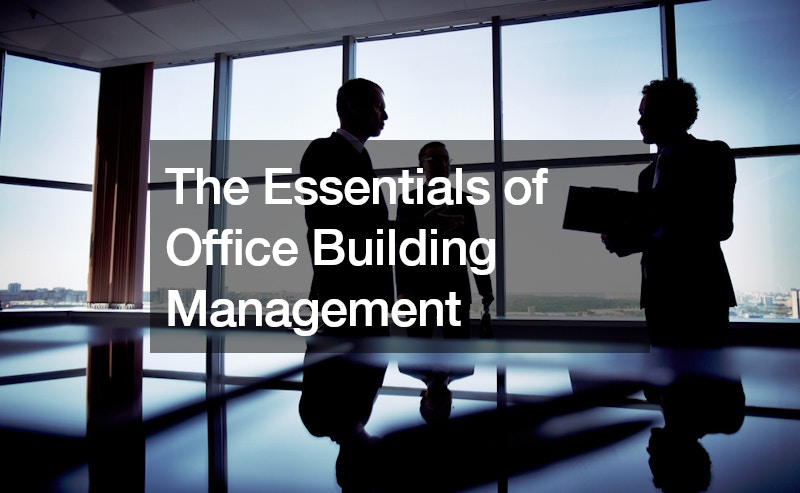
Embarking on the journey of real estate investment often involves the intricate world of office building management. Whether you’re a landlord overseeing your property or an institutional owner entrusting third-party management, understanding the nuances of this field is crucial for success. In this comprehensive guide, we’ll explore the key aspects of office building management, from the roles and responsibilities to the challenges and future trends.
The Dynamics of Property Managers
Office building management can take various forms. Some landlords opt to have in-house property management teams, ensuring direct control and oversight.
In contrast, institutional owners, such as insurance companies, may choose to hire renowned third-party management firms for a more passive approach to real estate investments.
Irrespective of the ownership structure, office building management revolves around maintaining tenant satisfaction, handling complaints, and ensuring the functionality of the property. The intricate dance between property managers and tenants is a delicate one, as tenant satisfaction plays a pivotal role in the long-term success of an office building.
The Role of Tenant Satisfaction in Lease Renewals
At the heart of effective office building management lies tenant satisfaction. A satisfied tenant is more likely to renew their lease, reducing the risk of vacancies and associated financial losses. As explained by industry experts, when lease expirations approach, having high tenant satisfaction can significantly influence the decision to renew. In the competitive real estate market, retaining existing tenants is often more cost-effective than acquiring new ones.
Office building managers, often aided by software systems, handle incoming calls and complaints from tenants. From temperature control issues to unemptied garbage bins, the scope of their responsibilities is vast. Moreover, in the era of increasing computerization, managers utilize technology to interface with office managers of tenant firms, creating a streamlined communication process for issue resolution.
The Cost Considerations and Challenges
While the benefits of effective office building management are evident, it comes at a cost. Property managers typically charge an annual or monthly fee, ranging from 8% to 12% of the monthly rent. This fee structure may vary based on the level of service provided. Some argue that lower fees may correlate with minimal effort on the part of property managers, while higher fees may indicate a commitment to exceptional service that adds value to both landlords and tenants.
One approach to mitigating costs is the tenant find service, particularly appealing to local property owners seeking a hands-on approach. This service involves hiring an agent to handle initial tenant searches, ensuring legal compliance and thorough vetting. While it incurs an upfront cost, it provides a middle ground for those who want to build relationships with tenants but seek assistance in the early stages.
Challenges in office building management extend beyond fees, with labor shortages impacting tenant improvement construction costs. When tenants vacate, attracting new ones becomes a priority. However, the costs associated with modifying spaces to suit individual tenant needs can be substantial, especially in a labor market facing shortages.
The Collaborative Dance: Leasing and Property Management
While property managers play a vital role in maintaining existing tenant satisfaction, leasing teams focus on attracting new tenants. The collaboration between leasing and property management is crucial, ensuring that spaces are presented optimally during tours and property visits. A well-lit, clean, and functional space enhances the chances of attracting and retaining tenants.
Leasing teams are primarily responsible for showcasing available spaces to potential tenants, but property managers play a critical supporting role. Coordination between the two teams ensures that properties are well-maintained and presentable during tours. From ensuring lights are on to addressing specific questions about security measures, property managers contribute to the overall success of lease negotiations.
The Future of Office Building Management
Looking ahead, the future of office building management holds intriguing possibilities. Technology is expected to play a significant role, with innovations like property management software and artificial intelligence streamlining processes. These advancements can improve efficiency in tenant communication, rent collection, and maintenance coordination.
Moreover, the gig economy and shared economy trends may influence the field. Freelance property managers or specialized services for specific tasks could become more prevalent, allowing landlords to tailor their property management approach based on unique needs.
As the real estate landscape evolves, the concept of self-management may resurface, empowered by user-friendly platforms. With the right tools, property owners may find it increasingly feasible to take on certain management responsibilities, creating a hybrid model that combines technology with personal oversight.
In conclusion, navigating the realm of office building management requires a nuanced understanding of its dynamics. From tenant satisfaction to cost considerations and future trends, effective management plays a pivotal role in the success of real estate investments.
.





